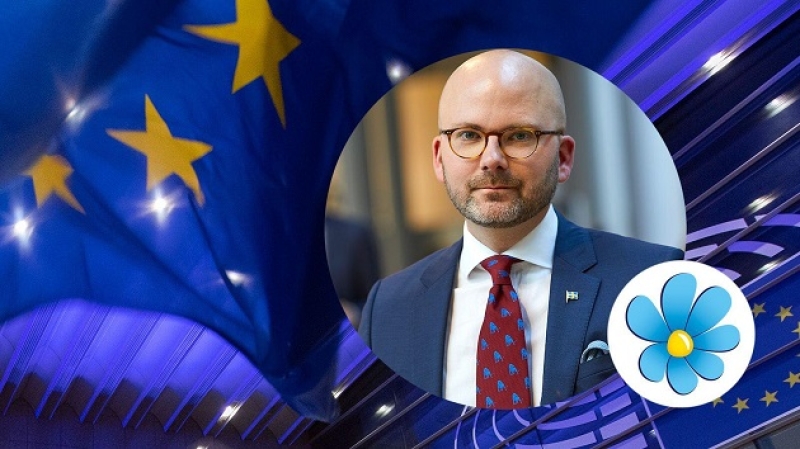- Young disabled people of BD vow to advocate for peace |
- World Leaders Urged to Defend Human Rights and Justice |
- Vegetable prices remain high, people buy in small quantities |
- Off-season watermelon brings bumper crop to Narail farmers |
- Climate Change Drives Deadly Floods, Storms, and Water Crises |
To Sanctify Bigotry: Examining the Case of Charlie Kirk

Charlie Weimers with EU flag and the Sweden Democrats’ party symbol, a bluebell.
On September 11, Charlie Weimers, a Swedish Member of the European Parliament and part of the European Conservatives and Reformists Group, rose during a Parliamentary session to request a minute of silence in memory of Charlie Kirk, who had been shot dead the day before during a political meeting at Utah Valley University in the U.S.
“Madam President, dear colleagues, the murder of political activist Charlie Kirk, a husband, loving father, and patriot, has shocked the world. We must strongly condemn political violence and rhetoric that incites violence. Will you stand with me in reflection and prayer in his honour, and I yield the rest of my time for a moment of silence?”
Weimers began his political career as a member of the Swedish Christian Democrat Party but later joined the Sweden Democrats, a nationalist, right-wing populist party rooted in neo-Nazi fringe organisations. It is now Sweden’s second-largest political party, with more than 20 percent of the electorate.
Condemning murder, political violence, and defending free speech is necessary, but this should not prevent us from scrutinising who is canonised as a victim of aggression. Charlie Kirk was 33 when he was murdered, leaving a wife and two children behind. He had admitted that when he founded Turning Point USA in 2012, he had “no money, no connections and no idea of what I was doing.”
Kirk’s rhetorical skill in countering progressive ideas and provoking audiences eventually attracted a large following and support from conservative leaders. President Trump praised him as “The Great, and even Legendary, Charlie Kirk” who understood America’s youth like no one else.
Yet Kirk’s ideology carried racist undertones. He dismissed white privilege as a myth, opposed the Civil Rights Act of 1964, promoted the “great replacement theory,” and targeted DEI programmes. He also denied climate change, criticised COVID-19 vaccine mandates, and spread false claims about election fraud.
While his murder is indefensible, so too is sanctifying a figure whose rhetoric promoted racism, division, and contempt. As an educator, I have witnessed the damage caused by such bigotry. To glorify such figures is both hurtful and dangerous.
Kirk’s so-called “debates” were not open discussions but aggressive, provocative spectacles filled with contempt for minorities, women, liberals, and science itself. Incitement to violence and hate speech may be protected under free speech, but they should never be normalised. They must be challenged with facts, science, and an unwavering respect for human rights.

